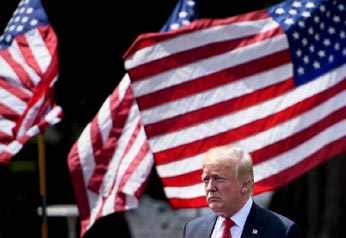WASHINGTON, June 7, 2018 (BSS/AFP) – Summits of the Group of Seven powers
are often marred by anti-globalist demonstrations in the streets of the host
city.
This time, the greatest threat to the liberal world order will be inside
the fence.
President Donald Trump comes to this week’s Quebec G7, which begins Friday,
touting an America First agenda that hits US allies with trade tariffs and
threatens multilateral free trade deals.
His stance will receive such a hostile reception from the other leaders of
the world’s richest democracies that some observers have suggested renaming
the G7 summit the G6+1.
Trump may well be distracted by preparations for his June 12 summit with
North Korea’s Kim Jong Un, which will be in Singapore immediately after the
rich world talking shop in Canada.
But it is not such a stretch to imagine that the US leader will enjoy a
warmer encounter with the autocrat from Pyongyang than with his Canadian
hosts and European and Japanese allies.
And leaders like Canada’s Prime Minister Justin Trudeau and Germany’s
Chancellor Angela Merkel admit it will be difficult to even agree a joint
communique at the two-day meeting.
“We know certainly that there will be frank and sometimes difficult
discussions around the G7 table, particularly with the US president on
tariffs,” Trudeau told reporters.
– All-out trade war –
Merkel told German lawmakers Wednesday before setting off for Canada that
there would be “no compromise for its own sake” and that dropping the
statement “may be the more honest way.”
But Trump’s decision to impose tariffs on steel and aluminum — and
eventually other goods, such as German luxury cars — have pushed G7 members
to the brink of all-out trade war.
Canada’s Trade Minister Francois Philippe Champagne was more blunt,
declaring: “What we are seeing is that the world economic order is under
pressure, under attack.”
And Trump is not likely to back down.
“There are disagreements,” top White House economics advisor Larry Kudlow
told reporters Wednesday. “He is sticking to his guns.”
Kudlow, in common with the longstanding expert consensus in the G7 nations,
had long opposed tariffs before joining Trump’s team, but now says he agrees
that the trade status quo hurts America.
“Until we can have reciprocal relationships we will not have free trade,
and we will not have fair trade,” Kudlow said. “So I think his cause is just
and I think the rest of the world agrees with him.”
Europe does not come to Quebec from a position of strength. Britain’s
Theresa May is mired in endless Brexit negotiations and Italian premier
Giuseppe Conte only formally took power on Wednesday.
French President Emmanuel Macron made initial headway in forming a public
friendship with Trump, but has failed to sway the US leader on any issue,
while Merkel has been distracted by coalition negotiations.
The G7’s only Asian member, Japan, has close relations with the White
House, but Prime Minister Shinzo Abe’s support for Trump’s North Korean
outreach has not seen his country spared the tariffs.
So the prospect of a joint communique encompassing trade seems faint, and
the summit may be capped by a simple statement from the hosts summarizing the
narrow areas of consensus.
A senior European Union official briefing reporters on the pre-summit
negotiations used discreet understatement to describe the impasse, but only
ended up underscoring the width of the rift.
“We find the tariffs to be illegal, so finding common language continues to
be a challenge,” he said.
– End of the world order –
The G7 developed in part because the world’s rich powers — despite their
supposed Cold War victory — became frustrated in working through the broader
multilateral system with lesser rivals.
The globalized economy that they helped build had winners and losers, of
course, but until Trump’s election the United States was seen as the system’s
uncontested leader and a major beneficiary.
But now, according to Laurence Nardon of the French Institute for
International Relations (IFRI), one of the main actors on the international
stage is no longer following the same script.
“It completely calls into question the international system,” she told AFP.
“This G7 summit is a new act in the drama. So far, the six are standing
strong, but Trump has not finished.
William Reinsch, a senior advisor at the Center for Strategic and
International Studies (CSIS) in Washington, said he expected the other six
nations of the G7 to “gang up” on Trump.
“The president’s proclivity, though, you know, when criticized is
consistently to hit back,” he added.
Since coming to office in January last year, Trump has pulled the US out of
the Paris climate accord, the Iran nuclear deal and the TPP Pacific free
trade deal.
– Feting US foes? –
While cozying up to authoritarian Chinese leader Xi Jinping, the
Philippines’ brutal Rodrigo Duterte, Saudi Crown Prince Mohammed bin Salman
and even Kim — he has clashed with May, Trudeau and Merkel.
“And it feels like we are treating our allies with contempt, while we are
feting our adversaries,” said Heather Conley, a CSIS senior vice president,
warning that any consensus statement would be “very short.”
The summit begins on Friday in La Malbaie, in Charlevoix, north of Quebec,
and runs until Saturday, when Trump will fly on to Singapore.



